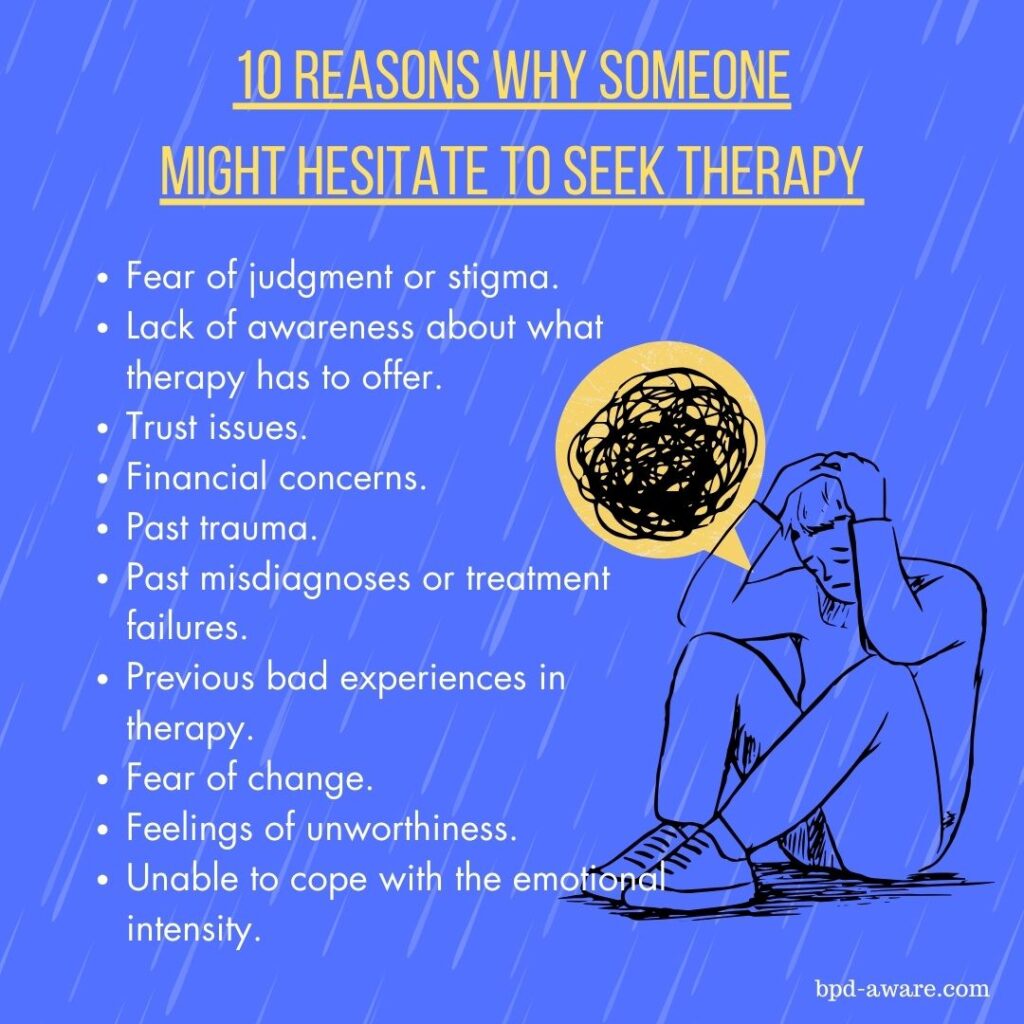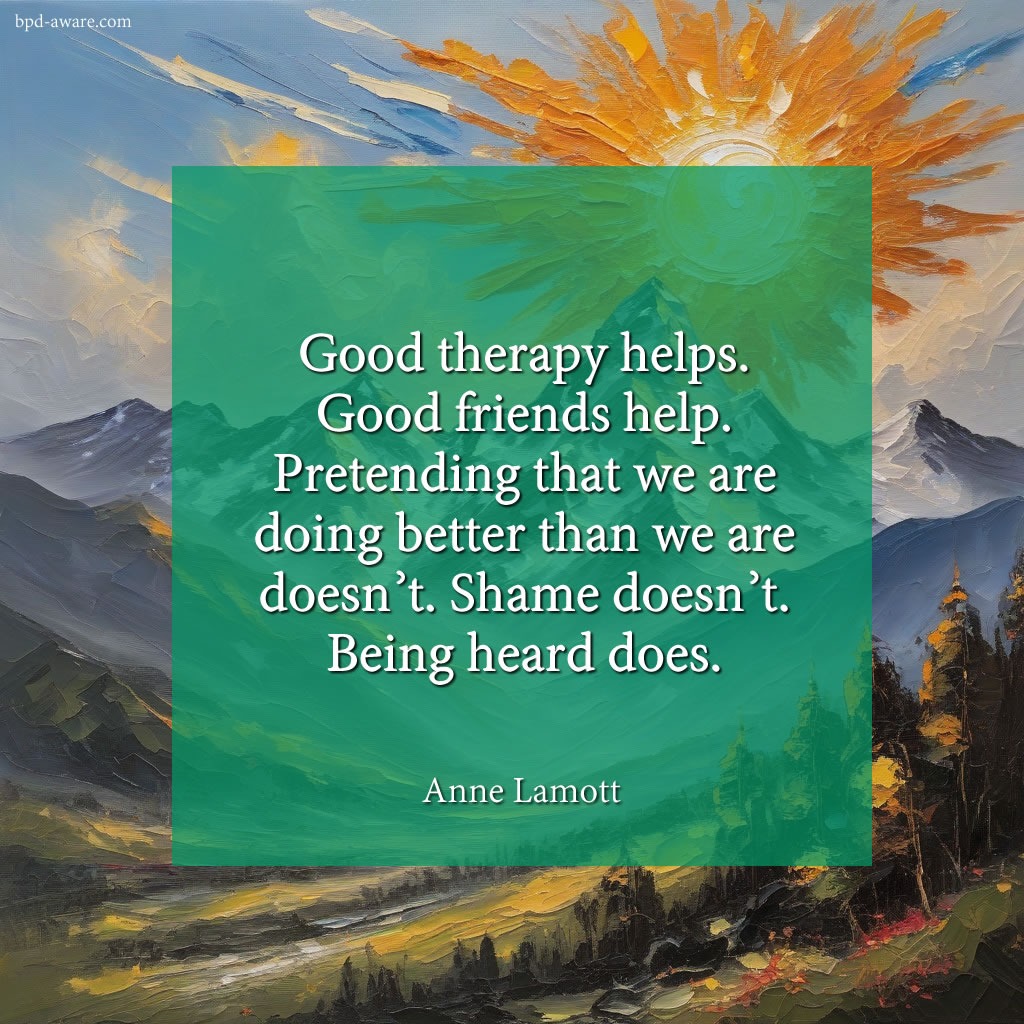Borderline Personality Disorder (BPD) is a mental health condition characterized by a fear of abandonment, emotional instability, unstable relationships, a distorted self-image, and a variety of other symptoms. It’s a disorder that between 2 and 6% of the population suffer from, many of whom aren’t being treated.
While there is no cure as such for BPD, it can be treated with a success rate as high as 77%. This treatment typically involves Dialectical Behavioral Therapy (DBT) or another form of therapy such as Schema Therapy. It can also involve one or more forms of medication.
With treatment having such a high success rate, it’s natural to wonder why more people with Borderline Personality Disorder aren’t actively seeking therapy or in a therapeutic program already. The truth of the matter though is that it’s rarely as simple as “deciding” to go to therapy.
There are many barriers to seeking a diagnosis and professional help. This article will explore just some of the reasons why someone with Borderline Personality Disorder might hesitate to seek a therapist.
Lack of Awareness: Most people simply aren’t well educated when it comes to matters of mental health. Just because someone has BPD or any other mental health condition, it doesn’t mean they realize they have a problem. Some people will grow up being told they’re just being “dramatic” or “silly” by those around them whenever they have an episode. They come to believe that they’re inherently maladjusted, not knowing they have a disorder that can be treated.
Similarly, many people don’t understand how therapy works. The only experience they might have with therapy is seeing the “Hollywood version” where rich people complain about the minor problems in their lives and feel no better for it after dropping a big wad of cash. It’s often not true to what therapy really looks like, at least not for conditions such as BPD.
Fear of Judgment or Stigma: The stigma surrounding mental illness is a significant barrier. People don’t tend to enjoy admitting there’s something amiss with them – whether it’s physically or mentally.
People worry that they may be judged negatively by those around them or even by the medical professionals they would be talking to.
The truth of the matter though is that 99% of medical professionals are just that: professional. While they’ll always be the occasional bad apple, the overwhelming majority of mental health professionals have a strong desire to help their patients.
Most friends and family members will be supportive too. If they care enough to be close to you, they will want you to get the help you need.
Trust Issues: Trust is a cornerstone of effective therapy, but for those with BPD, whose relationships are often fraught with instability and fear of abandonment, trusting a therapist can be extraordinarily challenging. The very nature of BPD can make building a therapeutic alliance difficult.
It takes time and effort to build the kind of trusting relationship required between a therapist and a patient. Often the first few sessions will be a kind of “feeling out” process by both sides. Therapists are trained and experienced in this and tend to not want to push patients along in the process before they’re ready.
Financial Concerns: The financial cost of therapy can be a practical barrier that varies from person to person and country to country. Sadly, many people don’t have access to affordable mental health care, and the ongoing nature of therapy can make it financially unsustainable for some.
It can be difficult to mentally justify spending thousands of dollars on therapy, especially since it’s not a guaranteed success. Therapy can also take a great deal of time, time which the individual might believe is better spent in other ways – such as earning money, rather than spending it.
However, the inner calm that treatment can bring to someone with BPD is more than worth it. Feeling mentally well can help provide stability to your life, which also carries over to your career prospects. Therapy can pay for itself in that regard.
If money is an issue, some therapists work on a sliding scale depending on your means. It’s always worth discussing the financial aspect with a therapist if that is an issue.

Past Trauma: Many individuals with BPD have a history of traumatic experiences, including abuse or neglect. Engaging with a therapist may trigger memories or feelings related to these traumas, creating a significant emotional barrier to seeking therapy.
Someone with these issues may simply not feel ready to talk about them or they may have issues with authority figures – which is something they may consider a therapist to be.
This can be a hard issue to get over. Time and a good support network can help but not everyone has those.
Misdiagnosis or Treatment Failures: The path to a correct BPD diagnosis can be long and fraught with misdiagnoses. Some people with BPD are initially misdiagnosed as having Bipolar Disorder due to some common symptoms. This can lead to being treated incorrectly – which feels like a waste of time and money.
Additionally, not all therapeutic approaches are effective for every individual. While DBT is considered the best form of treatment for most people with BPD, it doesn’t work for everyone. These experiences can lead to disillusionment with the mental health care system.
Whenever you’re talking about mental health and mental health conditions, it’s important to remember what a complicated subject it is. The mind is such a complex thing that there’ll never be a one-size-fits-all approach to any condition.
It’s important to try and remain open-minded to treatment. Cultivating a mindset of “that didn’t work so what can I try next?” can go a long way in all aspects of life.
Bad Therapy Experiences: Previous negative experiences with mental health professionals can leave a lasting impact. If someone has felt misunderstood, judged, or invalidated by a therapist in the past, they might be hesitant to try again.
Sometimes a therapist and patient just don’t click for whatever reason. It doesn’t necessarily mean that the therapist is bad or that the patient is in the wrong either.
Fear of Change: Therapy often requires confronting and working through deeply ingrained patterns and behaviors. For people with BPD, the prospect of delving into these areas can be daunting and can provoke a fear of the unknown consequences of change.
Change is always scary, whether you or not you have BPD but it’s important to remember that through change comes progress. A stagnant life is rarely a happy or fulfilling one.
Feelings of Unworthiness: Low self-esteem and feelings of unworthiness are common among those with BPD. These feelings can lead to a belief that they don’t deserve help or that their problems are insurmountable.
These can be difficult feelings to overcome. Ironically, therapy can and will help this issue but without the initial push into therapy then it won’t be treated. It’s a classic catch-22 situation.
If you know someone who you suspect has BPD then giving them a gentle nudge and a boost to their self-esteem can make a big difference to their outlook and can be the spark they need to seek treatment.
Emotional Intensity: The emotional intensity and mood swings associated with BPD can make maintaining a consistent therapeutic relationship challenging. Fluctuations in mood, energy, and self-image can lead to inconsistent attendance or engagement in therapy sessions. These are common experiences in many aspects of someone with BPD’s life and can make them hesitate to plan anything after experiencing plans fall through or fail time and time again.

Final Thoughts
These were just ten reasons with someone with BPD might not be in therapy right now but, truth be told, there are many, many more. As previously mentioned, the human mind and thought process is a deeply complex thing that can be difficult to understand.
If you have a loved one who you suspect has BPD (or has already been diagnosed but is avoiding treatment) it can help to have an open, calm discussion about therapy and treatment options. But, at the end of the day, the individual has to want to seek treatment themselves for the process to begin and have any chance of it to work. Pushing someone too hard can make them resist and become petulant towards the whole thing.
It’s a balancing act that must be performed with a delicate touch.
Thank you for reading “10 Reasons Why People with BPD Might Hesitate to Seek Therapy”. If you have any questions or personal experiences that you’d like to share with us, we’d love to hear from you in the comment box below.
Sources, Resources, and Further Reading
- 6 common reasons people avoid mental health treatment: a psychiatrist weighs in: https://www.talkiatry.com/blog/6-common-reasons-people-avoid-mental-health-treatment
- Why do people avoid mental health treatment?: https://thriveworks.com/blog/why-people-avoid-mental-health-treatment/
- Almost Half Of Americans Don’t Seek Professional Help For Mental Disorders: https://www.forbes.com/sites/michaeltnietzel/2021/05/24/why-so-many-americans-do-not-seek-professional-help-for-mental-disorders/
- What to Do If You Want to Quit Going to Therapy for BPD: https://www.verywellmind.com/want-to-quit-therapy-425341
















